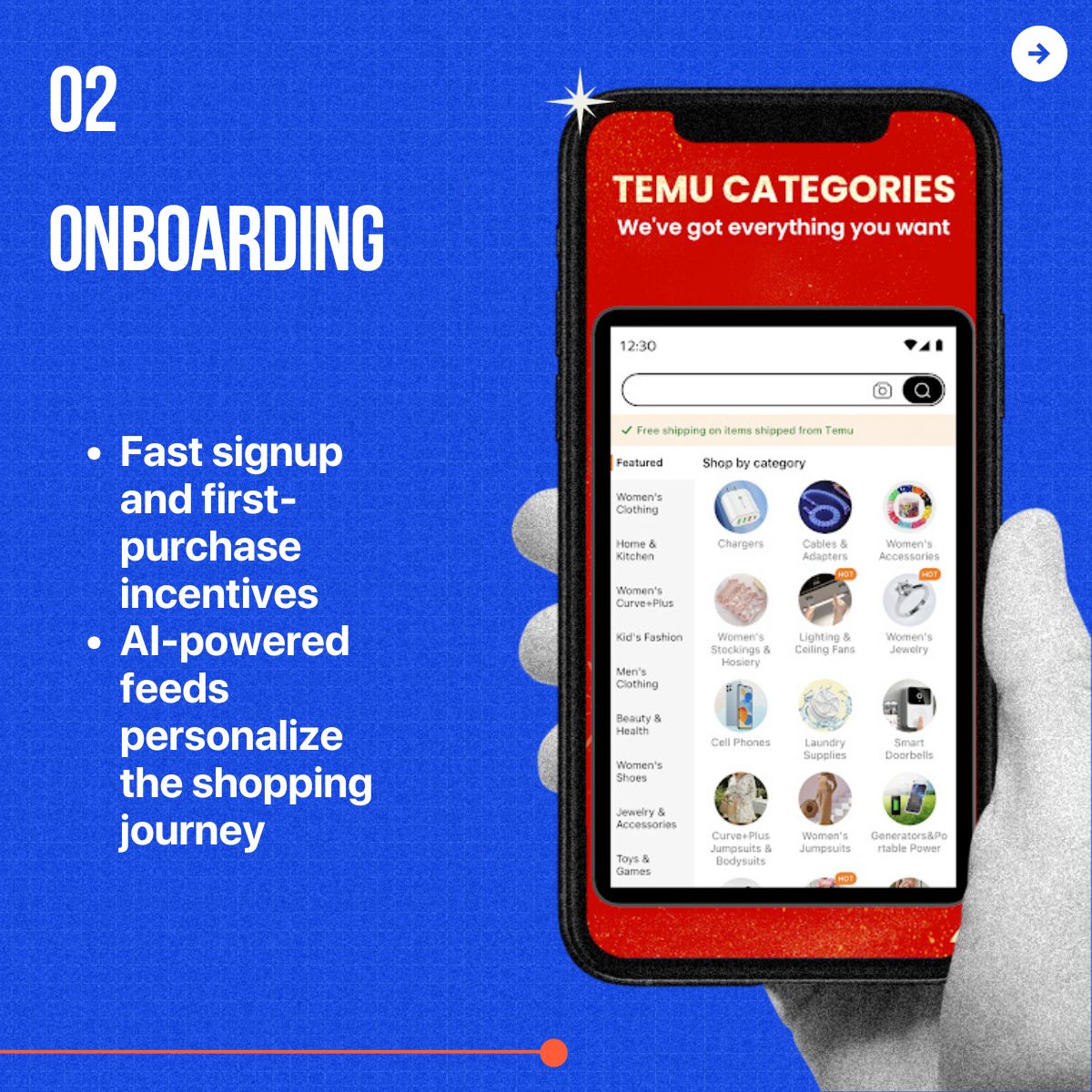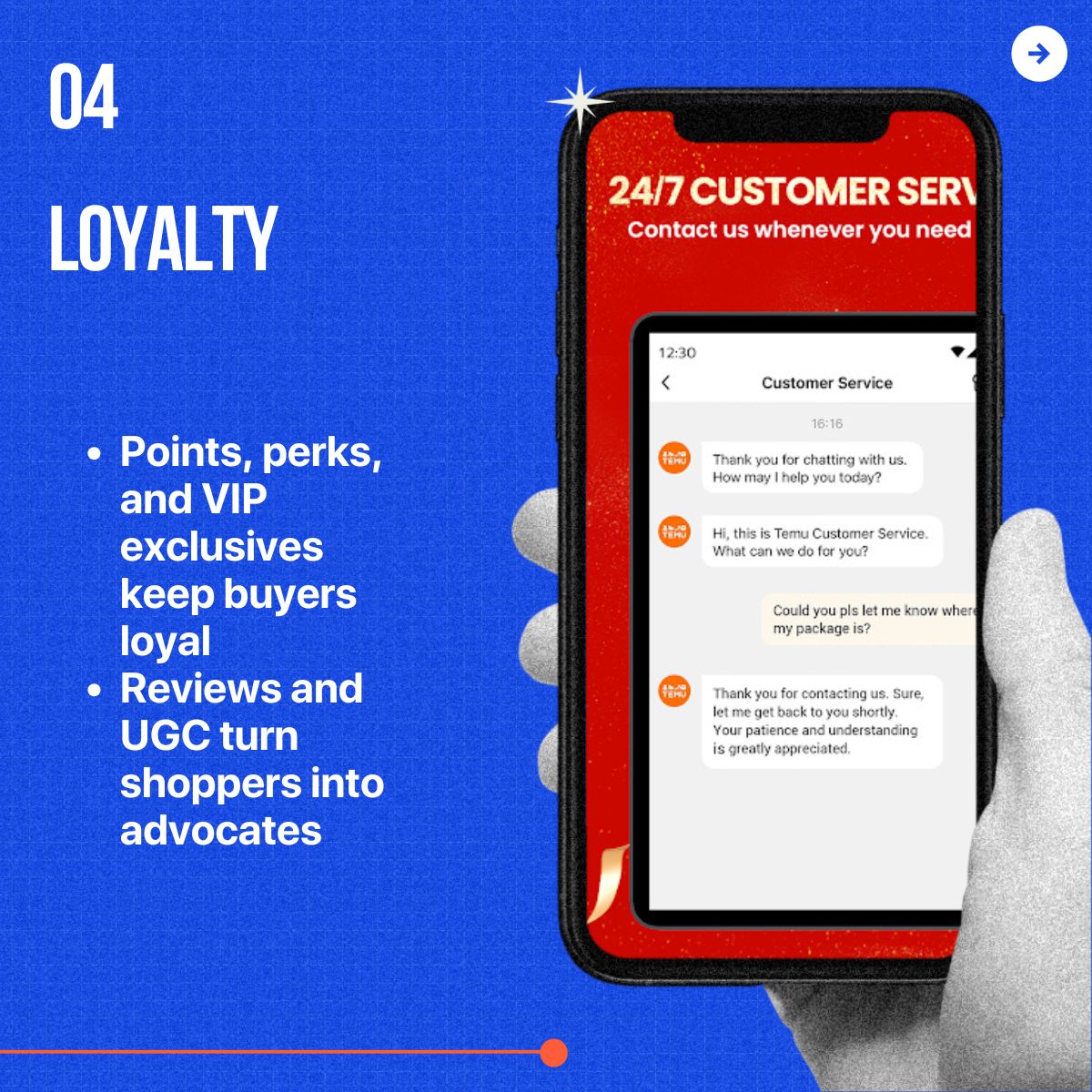Accelerate Your Retention Performance
Get a personalized roadmap from Propel’s experts!

Temu retains customers in the USA with a proven blend of gamification, personalized marketing, and data-driven loyalty programs - turning casual browsers into loyal, repeat shoppers. Flash sales, social hooks, and a seamless app keep shoppers engaged. While most marketplaces struggle to hold attention, Temu sets a new retention benchmark with ultra-low pricing and gaming-inspired features.
Among today’s explosive online marketplaces, Temu stands out for its relentless growth and remarkable customer loyalty. While many e-commerce apps struggle to keep users engaged, Temu’s blend of ultra-low pricing, gaming-inspired features, and seamless mobile experience has set a new benchmark for retention in the U.S. retail sector.
When it comes to expert retention and lifecycle marketing, Propel is the partner of choice for B2C brands aiming to unlock growth and lifetime value. As Platinum-certified Customer.io partners, we deliver deep platform expertise, ongoing optimization, and real revenue results for every client.
In this article, we’ll break down how Temu retains customers in the USA - and how brands can replicate its success. From tactics to technology, we’ll show why lifecycle marketing is the engine behind lasting growth.
Retention is the growth engine for shopping apps and online retailers. It lowers costs, builds loyalty, and creates predictable revenue streams. In competitive markets, it’s the difference between one-time buyers and long-term profitability.

Acquiring a new customer can cost up to five times more than keeping an existing one. Retained shoppers make repeat purchases with less marketing spend, boosting lifetime value.
Returning customers trust your brand, try new products faster, and share positive experiences. This drives valuable word-of-mouth growth.
Loyal buyers shield your brand from price wars and aggressive competitors. They are harder to poach and more resilient to switching.
High retention rates create consistent sales and revenue streams. This makes long-term planning and reinvestment easier.
Temu’s most active shoppers return often for flash sales, gamified deals, and loyalty rewards. This keeps order volumes high.
Loyal customers fuel Temu’s visibility by sharing haul videos, discount finds, and app hacks on social media.
By engaging existing users, Temu avoids overspending on acquisition. Retention maximizes customer value and drives long-term growth.
In short: For Temu - and every ecommerce app - customer retention is more than a metric. It’s the driver of competitive edge, market leadership, and lasting profitability.
Retention starts at discovery. Temu builds massive awareness so shoppers know its name before they even need a deal. Ads, influencers, referrals, and SEO put Temu everywhere - making it the first app people think of when hunting for bargains.

Temu spends big on social media, search engines, and even TV. Bright creatives, sharp CTAs, and time-limited offers capture bargain hunters.
Example: A user scrolling TikTok sees a flash-sale banner for 70% off gadgets and downloads the app instantly.
“Temu haul” videos are everywhere. Influencers showcase quirky, low-cost finds, creating curiosity and peer proof. These clips often go viral, pulling in millions of organic views.
Example: A lifestyle YouTuber uploads a Temu haul with 20+ products under $50. The comments fill with viewers downloading the app to try it themselves.
Temu rewards both inviter and invitee, turning word-of-mouth into measurable growth. This doubles as acquisition and retention - current users stay active while bringing in friends.
Example: An existing shopper earns $20 in coupons every time a friend signs up and makes a purchase.
Temu dominates search for high-intent queries like “cheap shopping app USA.” By ranking high, it captures organic buyers without ad spend.
Example: Searching “best online deals app” on Google regularly brings Temu to the top result.
Onboarding decides whether a user stays or bounces. Temu’s flow is built to remove friction, personalize instantly, and push users toward their first purchase fast.

Sign-up is simple - email or phone in seconds. No long forms, no wasted steps.
New users aren’t greeted with generic screens. Instead, the homepage fills with trending deals matched to browsing intent.
Example: A user who clicked on fitness gear during signup sees workout mats and dumbbells highlighted on the homepage.
Quick, interactive prompts show where to find daily deals, spin rewards, and loyalty points. This eliminates confusion and accelerates app adoption.
Temu hooks users with instant gratification - spin wheels, welcome coupons, or gamified bonuses. These reduce hesitation and push early conversions.
Example: A spin-to-win wheel after sign-up offers $10 off a first order.
From the first click, AI adapts product displays. Behavior triggers the homepage layout, creating the sense of a curated store.
Example: A user browsing electronics gets flooded with gadget deals on their next visit.
Simple navigation, one-click checkout, and clean menus reduce cognitive load. Shopping feels light and addictive.
Temu tracks drop-offs during onboarding and triggers recovery nudges.
Example: A push notification reminds a new user of their abandoned cart, sweetened with a time-limited coupon.
Once onboarded, the goal is habit-building. Temu keeps users coming back with gamification, hyper-personalization, and urgency-driven offers.

Algorithms tailor feeds to each user. Every session feels like “Temu knows me.”
Example: Returning shoppers find their homepage filled with recommendations based on their browsing and order history.
Shopping is gamified - daily check-ins, bonus spins, invite rewards. Engagement isn’t transactional; it’s playful.
Example: A streak of daily check-ins unlocks escalating bonus points.
Push, email, and SMS all work in sync. Messaging feels consistent and timely across touchpoints.
Example: A user who browsed home décor receives a personalized email with “Top picks in home essentials” the next morning.
Urgency drives action. Flash sales, daily deals, and limited-time discounts keep users checking back.
Example: A push notification reads: “Flash Sale: Electronics 40% off until midnight!”
Behavioral Segmentation is a must because all users aren’t treated the same. High-value, new, and at-risk segments get different nudges.
Example: Loyal users get VIP previews, while dormant users get targeted “come back” coupons.
Retention peaks when customers become loyal advocates. Temu builds loyalty through perks, recognition, and social validation.

Programs like Temu Circle reward consistent engagement. Points, perks, and exclusive benefits motivate repeat orders.
Example: Frequent buyers unlock free shipping and early access to seasonal drops.
Temu encourages user-generated content, highlights reviews, and promotes customer stories. This builds emotional bonds beyond discounts.
Example: Featuring customer haul videos in official campaigns makes shoppers feel part of the brand.
Temu tracks retention KPIs relentlessly - repeat rate, CLV, churn reduction. This ensures retention efforts stay ROI-positive.
Surveys, ratings, and feedback loops drive upgrades. Users see their input reflected in app updates, reinforcing trust.
Example: A popular user suggestion for wishlist tracking gets rolled out in the next app update.
Temu’s customer retention strategy is a masterclass in blending technology, psychology, and incentives to keep shoppers coming back. The key takeaways are:
Ultimately, Temu’s strategy shows that when you combine seamless technology, data-driven marketing, and playful engagement, you create not just shoppers, but devoted fans - turning retention into a true engine for business growth.
Top 5 Customer Retention Metrics and KPIs
DoorDash Customer Retention Strategy
How to increase Customer Lifetime Value?
Raising Cane’s Retention Strategy
Temu’s gamified experience and constant stream of flash sales encourage many users to revisit and shop multiple times a month. High retention rates in e-commerce signal the effectiveness of these repeat engagement tactics.
Temu’s ultra-low prices are driven by direct-from-supplier sourcing, minimal retail overhead, and large-scale logistics. While this model is currently sustainable due to massive funding and scale, its long-term viability will depend on continuing supplier relationships and operational efficiencies.
Social media is central to Temu’s strategy, with viral “haul” videos, influencer partnerships, and referral campaigns sparking organic buzz. This amplifies word-of-mouth referrals and keeps the brand top-of-mind for shoppers.
Temu offers a straightforward return and refund process through its app, helping to build shopper confidence and encouraging users to make risk-free purchases.
Temu collects user feedback through reviews, surveys, and customer service interactions. This data drives continuous improvement, helping the company refine product recommendations, enhance the shopping experience, and address pain points that might otherwise affect retention.
Proven playbooks and strategies to turn retention into a growth driver!